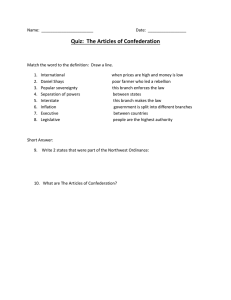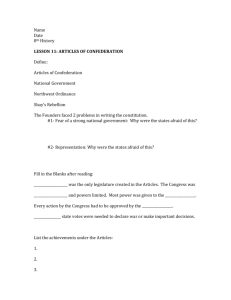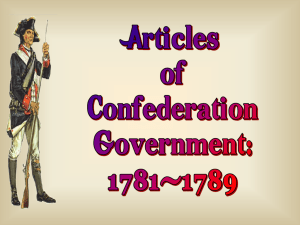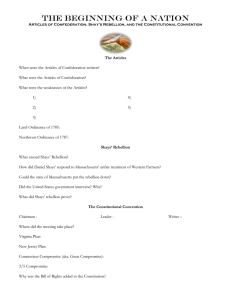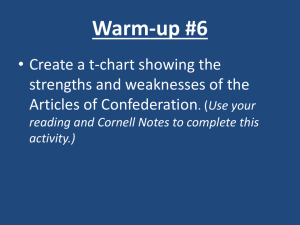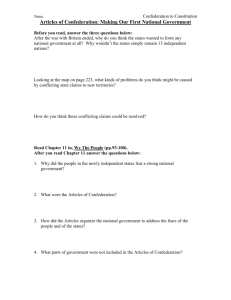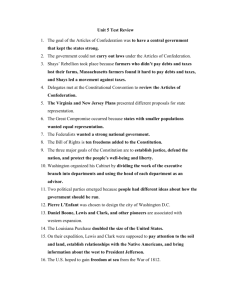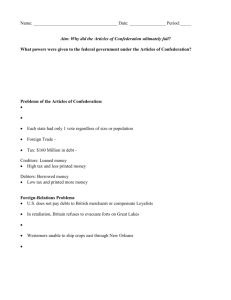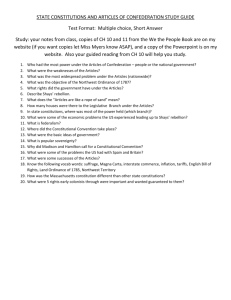THE CONFEDERATION GOVERNMENT OF AMERICA
advertisement
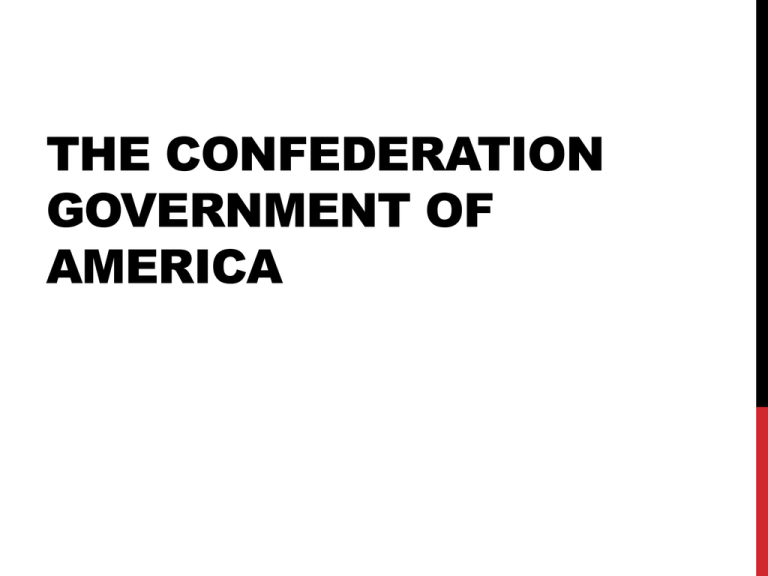
THE CONFEDERATION GOVERNMENT OF AMERICA ESSENTIAL QUESTION: What were the achievements and problems with the Confederation government after the American Revolution? CONFEDERATION: Definition: A group of states, more or less permanently united for common purposes. NEW BORDERS: Beyond the frontier, The Confederation government still had to deal with foreign powers. Great Britain: -Had 7 military strongholds in and around present day Western New York and Michigan. -Big fur traders, extremely nationalistic. Spain: -reclaimed Florida and the Gulf Coast around New Orleans. -Cut off American trade in the lower Mississippi River. (1784) FOREIGN TRADE: How could a government deal with these issues? -Britain still exported cheap goods to the U.S.A. -The new Congress was unable to pay off debts incurred from the war. -this led to Americans buying the British goods because they were cheaper, -Veterans were not paid the money they were owed. -economic depression resulted from these actions. **THESE ACTIVITIES UNDERMINE THE NEW GOVERNMENT’S POWER AND CONTROL.** IMPOSE TARIFFS Taxes placed on imported goods became the attempted solution. -However, each state decided to tax or not tax imports, NOT The Confederation. How do you think Britain reacted? -Britain circumvented tariffs by only exporting to states without tariffs. ADAM SMITH, ENLIGHTENMENT, AND LAISSEZ FAIRE ECONOMICS… FOREIGN TRADE CONTINUED… The Confederation decided to try and impose a 5% tax on all imports… -12 states agreed… -Rhode Island did not… -therefore the measure failed. *The Confederation required unanimous consent for approval, so the tariff was defeated. So what could be done to fix this problem? FOREIGN TRADE CONTINUED… Realization by many that a stronger central government may be needed to be truly “free.” Seriously?! But what about states rights? What about NOT being under the control of centralized government?!!!!!! STATES RIGHTS VS. FEDERAL GOV: WHATS THE BEST WAY? List as many pros for both states rights and federal rights: STATES RIGHTS: FEDERAL GOV: THE ISSUE OF INFLATION: Inflation is the economic term characterized by high prices due to excess currency in use. the end result is less valuable money. Prior to the war, there was a shortage of money which led to fur, tobacco, and even Indian wampum being used as currency. this happened because paper money became useless. Guess which state had severe inflation problems? RHODE ISLAND PAGE 144… SHAYS REBELLION: -Massachusetts was trying to pay of their state debt. -high taxes ended up putting many middle income farmers and workers in jail between 1780-1786 -average farmer in Mass. Was paying 1/3 their income in taxes. -many farmers had to foreclose on their property… until the summer of 1786… SHAYS REBELLION CONTINUED… -Daniel Shays, veteran of the Revolution led a mob of farmers upon the courts in Massachusetts. -The state sent in troops, put down the “little rebellion” and Shays fled to Vermont. -The Mass. Legislature did make some concessions to the mob’s demands. IMPACT OF SHAYS REBELLION: -Sympathizers with Shay were disgruntled due to an unresponsive government to their problems. -Wealthy Americans viewed the rebellion as an example of what too much freedom can lead to, and acknowledged that more power in centralized government may be necessary. -farmers across the states worried that similar problems would develop in their land as well. NEXT STEPS…
